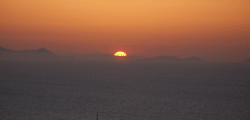USA resuming Daylight Savings Time: health risks?

Sunday at two a.m., the USA and some other nations change their clocks to go off of Standard Time and back to Daylight Savings Time.
At 2 a.m. on the morning of Sunday, March 13, those in the USA and many other nations will need to spring our clocks forward – and losing an hour of the day – for Daylight Saving Time. Sunset will be an hour later.
Because of that, sunset will be over an hour later next Friday.
Those of us who observe the weekly Sabbath from sunset Friday to sunset Saturday may wish to remember that.
Here is a link for Sunset Times for the U.S.A. (and international cities if longitudinal location is known).
Yesterday, CNN posted the following:
March 11, 2016
(CNN) Daylight saving time is Sunday, and losing sleep after clocks “spring forward” an hour could be more than just an annoyance. This small time shift can significantly raise the risk of health-related issues.
A recent study found that the overall rate for stroke was 8% higher in the two days after daylight saving time. Cancer victims were 25% more likely to have a stroke during that time, and people older than 65 were 20% more likely to have a stroke.
The researchers, based in Finland, compared the rate of stroke in more than 3,000 people hospitalized the week after a daylight saving time shift to the rate of stroke in more than 11,000 people hospitalized two weeks before or after the week of transition.
“Stroke risk is highest in the morning hours,” Dr. Jori Ruuskanen, study author from the University of Turku, said in an email. “Previous studies have also shown that the disruption of the circadian clock due to other reasons (e.g. due to rotating shift work) and sleep fragmentation are associated with an increased risk of stroke. However, we did not know whether stroke risk is affected by DST transitions. What is common in these situations is the disturbed sleep cycle, while the immediate mechanisms for the increased risk are unknown at the moment.
Daylight saving time is a small change, Ruuskanen said, but it affects whole nations twice a year. http://www.cnn.com/2016/03/11/health/daylight-saving-time-health-effects/
Irrespective of any possible health risks, the changing of the clocks, etc. can be annoying and affect sleep cycles. Either way, in the USA the clocks change at 2:00 a.m.
Some items of possibly related interest may include:
Is Revelation 1:10 talking about Sunday or the Day of the Lord? Most Protestant scholars say Sunday is the Lord’s Day, but is that what the Bible teaches?
Another Look at the Didache, Ignatius, and the Sabbath Did Ignatius write against the Sabbath and for Sunday? What about the Didache? What does the actual Greek reveal?
The Sabbath in the Early Church and Abroad Was the seventh-day (Saturday) Sabbath observed by the apostolic and post-apostolic Church? Here is a related sermon video The Christian Sabbath and How and Why to Keep It.
The Dramatic Story of Chinese Sabbathkeepers This reformatted Good News article from 1955 discusses Sabbath-keeping in China in the 1800s.
Is God Unreasonable? Some have suggested that if God requires Sabbath-keeping He is unreasonable. Is that true?
Is There “An Annual Worship Calendar” In the Bible? This paper provides a biblical and historical critique of several articles, including one by the Tkach WCG which states that this should be a local decision. What do the Holy Days mean?
Holy Day Calendar This is a listing of the biblical holy days through 2024, with their Roman calendar dates. They are really hard to observe if you do not know when they occur 🙂 In the Spanish/Español/Castellano language: Calendario de los Días Santos. In Mandarin Chinese: 何日是神的圣日? 这里是一份神的圣日日历从2013年至2024年。.
 |
Tweet |
|